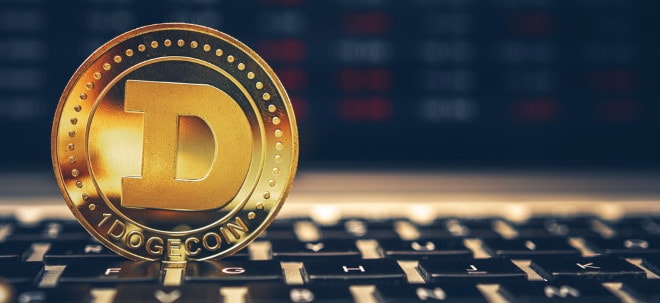Should struggling Intel receive billions in taxpayer dollars?
Werte in diesem Artikel
Less than a week after the Biden administration officially awarded Intel with the largest grant under its signature CHIPS and Science Act, the semiconductor maker's longtime CEO is out, and some experts are sounding the alarm over the government sending a massive amount of taxpayer dollars to the struggling company.Scott Lincicome, vice president of general economics and trade at the Cato Institute, told FOX Business in an interview that the situation raises a lot of red flags, particularly because the Commerce Department's nearly $8 billion award to Intel follows the $3 billion defense contract the company landed in September – and now the chief architect of the company's turnaround plan, Pat Gelsinger, has reportedly been forced to step down for mismanagement."Couple that with the concern that the Biden administration was rushing to get these grants out to ‘Trump-proof’ them before [President-elect] Trump takes over in January, and it is looking more and more like a classic industrial policy boondoggle," Lincicome said.The Cato expert acknowledged that there is still a lot of time for Intel to right the ship and deliver, but argues the situation does not look good. He is concerned that the U.S. government may be willing to treat Intel – the nation's largest domestic semiconductor maker – as Too Big to Fail, and do whatever it takes to keep the company afloat.INTEL'S FINANCIAL STRUGGLES THREATEN BIDEN ADMIN CHIP STRATEGYLincicome says that could lead to even worse decisions down the road, such as further subsidies, new protectionism and tariffs, and potentially bad investment decisions from the company itself.Finance attorney John Alper of the Alper Law firm, says that allocating $8 billion of taxpayer money to Intel through the CHIPS Act was always going to be a bold move, and agrees it’s especially risky given the company’s recent financial and operational struggles. Alper says that from a fiscal perspective, this level of funding needs to come with strong accountability measures, and that the government must ensure that these funds are tied to tangible progress in domestic semiconductor production. HOW INTEL BECAME A TAKEOVER TARGET"While Intel's troubles raise valid concerns, the broader goal of reducing reliance on foreign chipmakers is critical," Alper said. "If the funds are well-managed and result in a stronger U.S. semiconductor industry, it could still prove to be a worthwhile investment despite the risks."Cody Moore, a partner and advisor at Wealth E&P, says he is not convinced awarding Intel was the best use of taxpayer funds, arguing the move seems to reward a company that has struggled to keep pace with its competitors. "However," Moore told FOX Business, "The hope is that this investment will help revitalize their productivity, create jobs, drive economic growth through domestic semiconductor production, and reduce our reliance on foreign manufacturing—particularly given the importance of chips in supporting the AI boom."Thomas J. Cryan, a tax historian and attorney, says assessing the value and effectiveness of taxpayer dollars, specific to the CHIPS Act, and investments in semiconductor manufacturers such as Intel, depends on a few competing elements. GET FOX BUSINESS ON THE GO BY CLICKING HEREHe says tensions must be balanced between wanting to keep the U.S. supply chain secure for these needed products, ideally allowing the free market to produce real efficiencies no matter the consequences, supporting a critical company during a challenging time for its management and operations, and countering the significant government-funded companies in China that have secured unfair footholds in the technology marketplace. "On balance," Cryan argues, "It might be effective to award Intel a significant contract, in light of a 10-year U.S. strategic plan."Weiter zum vollständigen Artikel bei FOX Business
Ausgewählte Hebelprodukte auf Intel
Mit Knock-outs können spekulative Anleger überproportional an Kursbewegungen partizipieren. Wählen Sie einfach den gewünschten Hebel und wir zeigen Ihnen passende Open-End Produkte auf Intel
Der Hebel muss zwischen 2 und 20 liegen
| Name | Hebel | KO | Emittent |
|---|
| Name | Hebel | KO | Emittent |
|---|
Quelle: FOX Business
Nachrichten zu Intel Corp.
Analysen zu Intel Corp.
| Datum | Rating | Analyst | |
|---|---|---|---|
| 10.01.2025 | Intel Hold | Deutsche Bank AG | |
| 07.01.2025 | Intel Market-Perform | Bernstein Research | |
| 04.11.2024 | Intel Verkaufen | DZ BANK | |
| 01.11.2024 | Intel Market-Perform | Bernstein Research | |
| 01.11.2024 | Intel Hold | Deutsche Bank AG |
| Datum | Rating | Analyst | |
|---|---|---|---|
| 28.10.2022 | Intel Outperform | Credit Suisse Group | |
| 01.08.2022 | Intel Outperform | Credit Suisse Group | |
| 29.04.2022 | Intel Outperform | Credit Suisse Group | |
| 15.02.2022 | Intel Outperform | Credit Suisse Group | |
| 27.01.2022 | Intel Overweight | JP Morgan Chase & Co. |
| Datum | Rating | Analyst | |
|---|---|---|---|
| 10.01.2025 | Intel Hold | Deutsche Bank AG | |
| 07.01.2025 | Intel Market-Perform | Bernstein Research | |
| 01.11.2024 | Intel Market-Perform | Bernstein Research | |
| 01.11.2024 | Intel Hold | Deutsche Bank AG | |
| 01.11.2024 | Intel Neutral | UBS AG |
| Datum | Rating | Analyst | |
|---|---|---|---|
| 04.11.2024 | Intel Verkaufen | DZ BANK | |
| 17.09.2024 | Intel Underweight | JP Morgan Chase & Co. | |
| 02.08.2024 | Intel Verkaufen | DZ BANK | |
| 02.08.2024 | Intel Underweight | JP Morgan Chase & Co. | |
| 05.06.2024 | Intel Sell | Goldman Sachs Group Inc. |
Um die Übersicht zu verbessern, haben Sie die Möglichkeit, die Analysen für Intel Corp. nach folgenden Kriterien zu filtern.
Alle: Alle Empfehlungen


